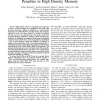Free Online Productivity Tools
i2Speak
i2Symbol
i2OCR
iTex2Img
iWeb2Print
iWeb2Shot
i2Type
iPdf2Split
iPdf2Merge
i2Bopomofo
i2Arabic
i2Style
i2Image
i2PDF
iLatex2Rtf
Sci2ools
101
click to vote
MICRO
2010
IEEE
2010
IEEE
Elastic Refresh: Techniques to Mitigate Refresh Penalties in High Density Memory
High density memory is becoming more important as many execution streams are consolidated onto single chip many-core processors. DRAM is ubiquitous as a main memory technology, but while DRAM's per-chip density and frequency continue to scale, the time required to refresh its dynamic cells has grown at an alarming rate. This paper shows how currently-employed methods to schedule refresh operations are ineffective in mitigating the significant performance degradation caused by longer refresh times. Current approaches are deficient
| Added | 14 Feb 2011 |
| Updated | 14 Feb 2011 |
| Type | Journal |
| Year | 2010 |
| Where | MICRO |
| Authors | Jeffrey Stuecheli, Dimitris Kaseridis, Hillery C. Hunter, Lizy K. John |
Comments (0)

